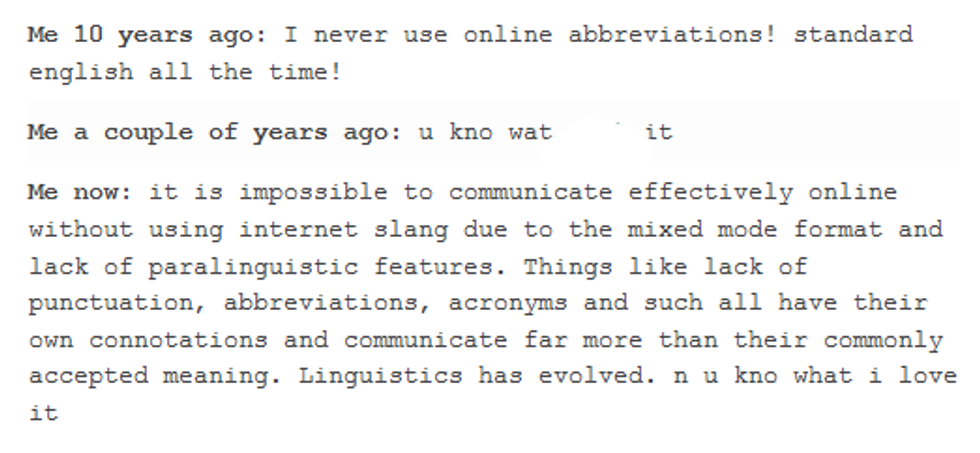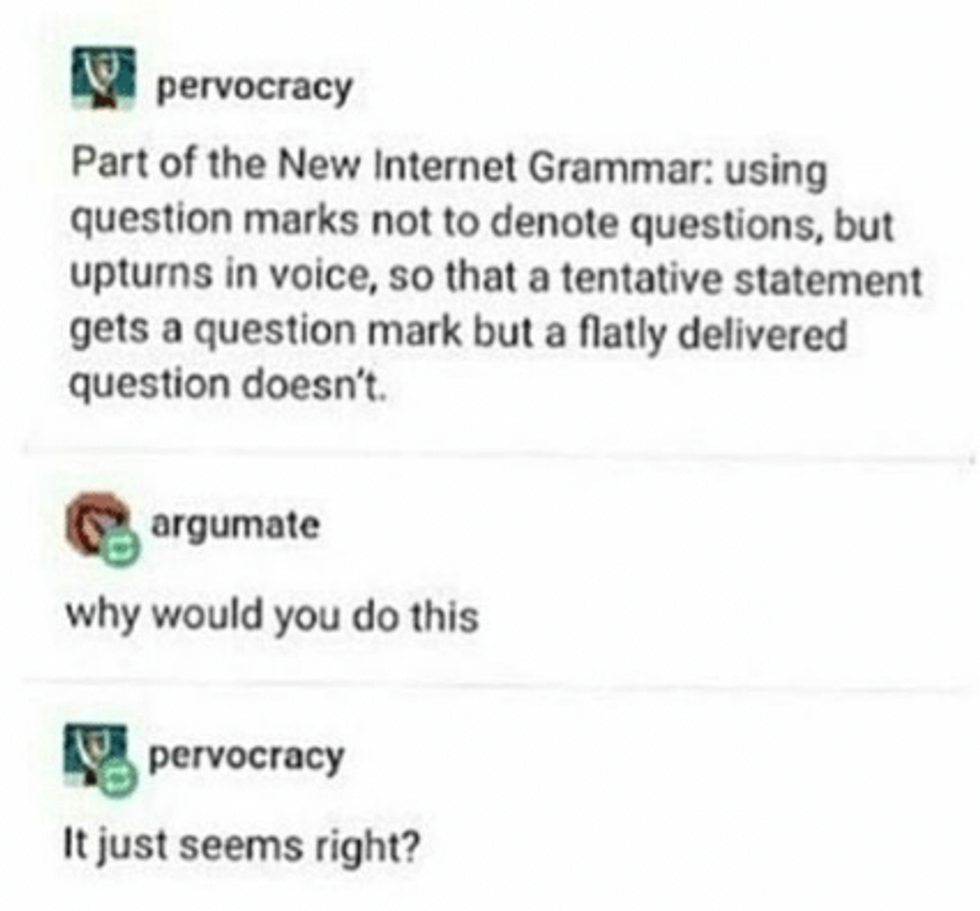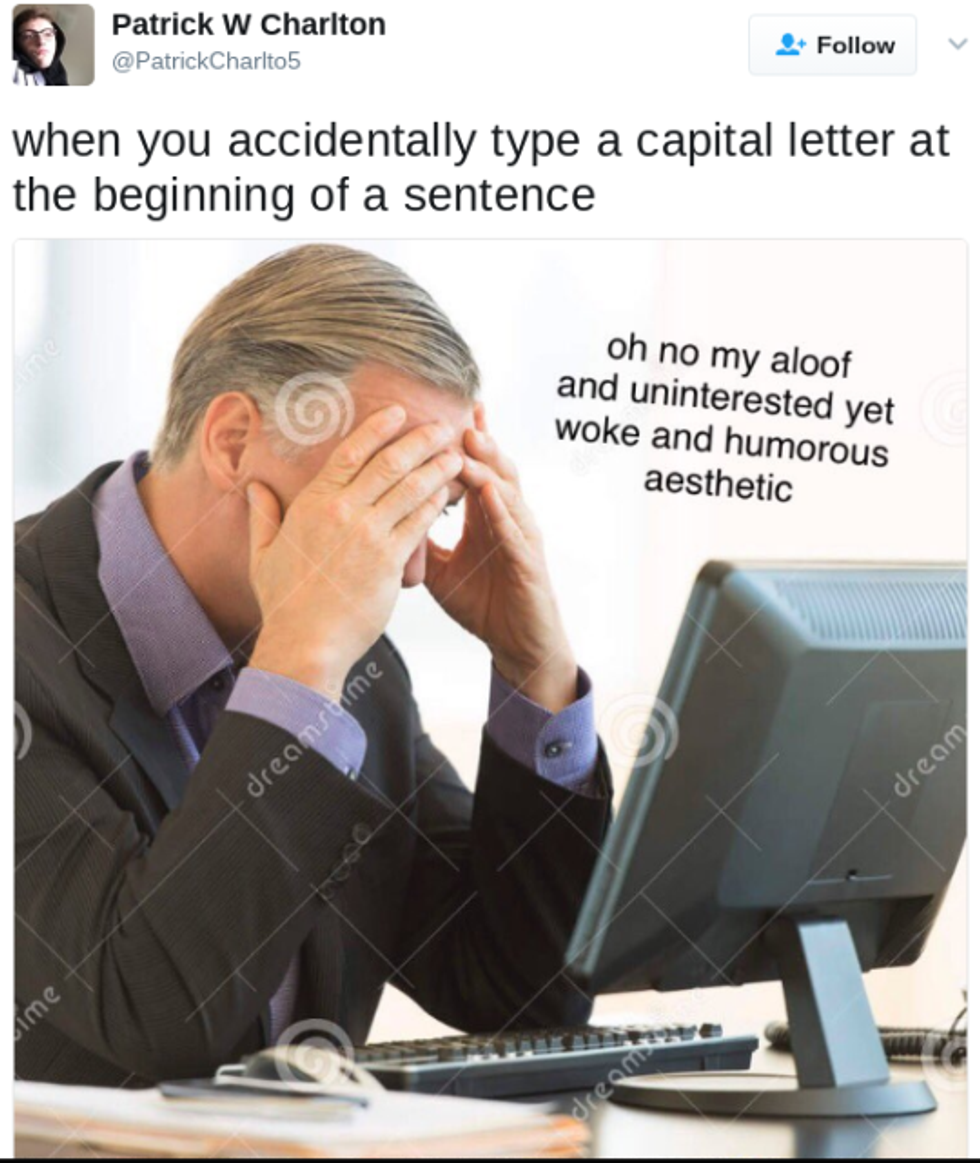It has been said multiple times over and over that one cannot express emotion over text messages. In written word, it simply isn’t possible to convey facial expressions, inflection, tone, and volume to the degree that spoke word provides. It’s the one major downside that such a form of communication has. Which is why emoticons (and then, later, emojis) were invented; so one can throw a smiley face at the end of their passive-aggressive message to show that they’re just joking.
But those who claim that they cannot understand the emotional undertones of modern written word are simply not fluent in the type that has formed since the rise of the internet. Yup. Today, we’re going to be discussing the grammar of the internet.
There are about 55 keys on a standard keyboard, which include, among others; the alphabet, numbers, shift, control, alt, and enter keys. With these simple buttons, individuals on the internet were able to create their own language with various subcultures depending on which website one frequents. Most of the examples today will be taken from Tumblr, Twitter, and Instagram, but these grammatical rules can be used throughout most of the internet interchangeably.
1. Questions And Answers
One of the most common internet linguistics tropes is when an individual will end a statement in a question mark, instead of a period, to portray uncertainty? And a questionable inflection? Instead of just ending it in a period, which wouldn’t express the same hesitancy? Usually, this is used when someone is talking about their emotions? And their just a little sad? Or something?
The interesting counterbalance to this, is when an individual will end a question in a period, as if to express irritation or a blunt inflection. Why do they do this. Does anyone understand. How did it start. How can you tell the difference between an actual question and an implied question.
Perhaps a clearer example:
It’s due tomorrow.
It’s due tomorrow?
It’s due tomorrow??
With the first sentence, it’s a simple statement. The paper is due tomorrow. It’s a fact that expresses causality and comfort. With the second sentence, the speaker is unsure. It might be due tomorrow. It might be due today. Or yesterday. Who knows. With the third sentence, however, the stakes have been raised. Instead of just expressing an uncertainty, this sentence is able to portray surprise. From the sentence alone, the reader is able to tell that the the speaker has not even started the project.
And for questions:
Why would you do this.
Why would you do this?
Why would you do this???
The same applies, only switched. The first question is very casual, blunt, and not at all surprised by what is happening. The third is very expressive, mostly showing shock or confusion. It is usually rhetorical, as is the first question. The second question is far too formal and is genuinely interested in the answer. That’s the real indicator; the answer. If the question expects an answer, it should be formatted properly. If not, then it should have a period or multiple question marks.
2. Comma Ellipsis,,,
Something new that has come along in the recent years, is the act of using commas in the place of ellipsis to express,,,, something. While it’s up to interpretation, when I read or use comma ellipsis it’s to express annoyance; rather than a pause, skip of information, or confusion, which ellipsis tend to be used for.
Examples:
Anyway … It’s weird.
Anyway,,, it’s weird.
The first sentence just expresses a pause, where the speaker took a moment to breathe or think. It gives the phrase a somewhat softer tone. While the second one barely pauses at all. Instead, it plows through with the sentence, still finishing the thought. I relate a comma ellipse to an eye-roll. The speaker doesn’t stop talking as they roll their eyes. Some people think it’s stupid, though.
3. Keyboard Smashing
Next, keyboard smashing. This is a form of communication that has no translation and is different every time you see it. Sometimes it’s like this: tryuiokml, and sometimes it’s like this: esrdtcfgvibhopnjo, but it means the same thing. I am so excited right now that I cannot form words to express how cool this is. Another way to say this is by just putting: !!!!!, which is much neater and gives off the same effect.
4. Capitalization and Punctuation
Lastly I’m going to talk about how people on the internet just don’t capitalize anything ever and sometimes punctuation is used so rarely that everything is just one long run-on sentence with no real pauses or endings this can be used in online storytelling to give off a stream of consciousness all the thoughts are just flowing out and it's really laid-back and chill but also has a lot to say most people who aren’t used to such a way of communication really hate that the internet does this but i feel like my boy ee cummings would dig it.
Now, putting it all together:
Internet syntax is strange? It’s different, but it’s not,,, hard. if you just use it in practice then it makes sense. Why wouldn’t you write like this. It’s so much easier to understand? To express tone? wertyuiolxc I just !!!! love it !!!! so much??? How the internet has created it’s own language??? That everyone can understand, given time and context??? qwertyuiop!!!
Of course, this was just a crash course, and there are an indescribable amount of grammar rules for the internet, including the wide expansion of hashtags, emojis, memes, gifs, and reaction photos. The internet has a language of it’s own, and this barely scrapes the surface of it. But maybe now you get it?





















